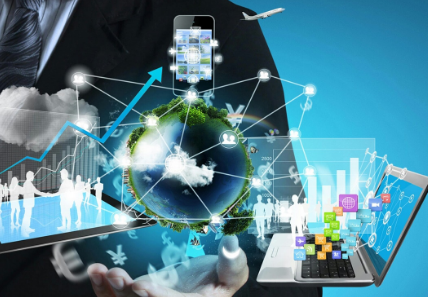
Technology assumes a basic role in embellishment the global economy, affecting industries across borders and changing the manner wherein businesses operate. From e-commerce and digital payments to automation and artificial intelligence, advancements in technology have fundamentally impacted how work and items are produced, marketed, and distributed on a global scale. As technology continues to evolve at a high speed, its influence on the economy is becoming more critical, creating two opportunities and challenges for businesses and economies all around the planet.
1. The Influence of Technology has transformed the global economy in recent years.
technology has revolutionized the global economy in manners that were previously unimaginable. The fast advancements in digital technology, artificial intelligence, automation, and the internet have completely transformed the manner in which businesses operate and how work and items are produced and consumed on a global scale. These technological advancements have not recently changed the manner in which people communicate and interact; however, they have likewise essentially impacted the manner in which economies ability and develop.
One of the main ways in which technology has transformed the global economy is through the digital revolution. The rise of the internet and e-commerce has completely changed the manner in which businesses operate and connect with customers. Companies can now reach a global audience with the snap of a button, enabling them to sell their products and services to customers from one side of the planet to the other. This has expanded market opportunities and driven economic development in manners that were previously impossible.
Artificial intelligence and automation are likewise assuming an imperative part in moulding the global economy. The use of AI technology has enabled businesses to streamline processes, improve efficiency, and reduce costs. Automation has additionally revolutionised industries like assembling, transportation, and healthcare, leading to increased productivity and competitiveness. While these advancements have undoubtedly created new opportunities for businesses, they have likewise raised concerns about potential work displacement and income inequality.
Another huge effect of technology on the global economy is the rise of the gig economy and remote work. The proliferation of digital platforms and tools has made it easier for people to work remotely and take on freelance gigs, enabling them to earn a living from anywhere on the planet. This has changed the manner in which people work as well as enabled businesses to take advantage of a global pool of talent, leading to greater innovation and coordinated effort.
Furthermore, technology has enabled the fast development of new industries, for example, fintech, biotech, and renewable energy. These emerging industries are driving economic development and creating new open positions while likewise addressing pressing social and environmental challenges. The reception of new technology has likewise led to the creation of new business models and disturbance of conventional industries, constraining businesses to adjust and innovate to remain competitive in the global marketplace.
2. Examples of tech advancements like artificial intelligence and e-commerce forming industries worldwide
Technology has revolutionised industries worldwide, forming how business is done and affecting the global economy in unprecedented ways. Two key advancements driving this change are artificial intelligence (AI) and e-commerce.
Artificial intelligence, or AI, refers to the development of computer systems that can perform tasks that regularly require human intelligence. This technology is being used in different industries to streamline operations, increase efficiency, and drive innovation. One example of AI moulding industries worldwide is in the healthcare sector, where AI-powered algorithms can analyse patient data to make accurate diagnoses and suggest personalised treatment plans. This can possibly improve patient outcomes and reduce healthcare costs.
In the assembling sector, AI is being used to optimise creation processes and improve production network management. By utilising AI-powered predictive analytics, manufacturers can forecast demand, identify potential bottlenecks, and optimise creation schedules to meet customer needs more effectively. This improves operational efficiency as well as reduces waste and overall costs.
E-commerce, or electronic commerce, refers to the trading of labour and products over the internet. This has transformed the retail business, enabling businesses to reach a global audience and operate without the constraints of conventional physical stores. E-commerce platforms like Amazon, Alibaba, and eBay have become central parts in the global economy, upsetting conventional retail models and reshaping consumer behaviour.
The rise of e-commerce significantly affects the coordinated factors industry, with companies leveraging technology to improve inventory network perceivability, optimise route arranging, and enhance last-mile delivery capabilities. This brings enabled retailers to the table faster and more reliable transportation choices, meeting the developing expectations of consumers for convenience and speed.
Furthermore, the integration of AI into e-commerce platforms has enabled businesses to personalise the shopping experience for customers through targeted recommendations, chatbots, and virtual assistants. This enhances customer fulfilment as well as drives sales and reliability by giving a seamless and intuitive shopping experience.
The mix of AI and e-commerce has additionally given rise to new business models, for example, membership-based services, online marketplaces, and direct-to-consumer brands. These innovative approaches are disturbing customary industries and creating new opportunities for entrepreneurs and businesses to connect with customers in novel ways.
3. How technology has enabled businesses to reach new markets and improve productivity
Technology has revolutionised the manner in which businesses operate in the present global economy. One critical advantage that technology has brought to businesses is the capacity to reach new markets and improve productivity. The internet, specifically, has made it easier for businesses to expand their reach beyond their neighbourhood markets and tap into a global customer base.
With the rise of e-commerce platforms and online marketplaces, businesses of all sizes presently have the chance to sell their products or services to customers all over the planet. This has opened up new revenue streams and useful learning experiences for companies that were previously limited by geographic constraints. Private companies, specifically, have benefited from this shift, as they can now compete on a level battleground with larger partnerships in the global marketplace.
As well as expanding their customer base, technology has additionally enabled businesses to improve their productivity through automation and streamlining of processes. The use of advanced software and tools has made tasks like inventory management, customer relationship management, and monetary reporting more efficient and accurate. This has allowed businesses to focus their time and resources on more strategic activities that drive development and innovation.
Read Also: How I Used Machine Learning to Make My Software Better
Furthermore, technology has additionally enabled businesses to enhance coordinated effort and communication among employees, regardless of their actual area. With the rise of cloud-based joint effort tools and video conferencing platforms, teams can now work together seamlessly from different regions of the planet. This has not just improved productivity by reducing the time and costs associated with travel, yet it has likewise fostered a more connected and engaged workforce.
Another key advantage that technology has brought to businesses is the capacity to collect and analyse data to make informed decisions. With the rise of enormous data and analytics tools, companies can now gather valuable bits of knowledge into customer behaviour, market trends, and operational performance. This data-driven approach has enabled businesses to tailor their strategies and offerings to meet the needs and preferences of their customers, ultimately leading to higher levels of customer fulfilment and reliability.
Overall, the influence of technology on the global economy can’t be understated. From expanding market reach to further developing productivity and fostering cooperation, technology has empowered businesses to thrive in an increasingly competitive and interconnected world. As technology continues to evolve, businesses should remain agile and innovative to remain ahead of the curve and capitalise on the opportunities that digital change presents.



